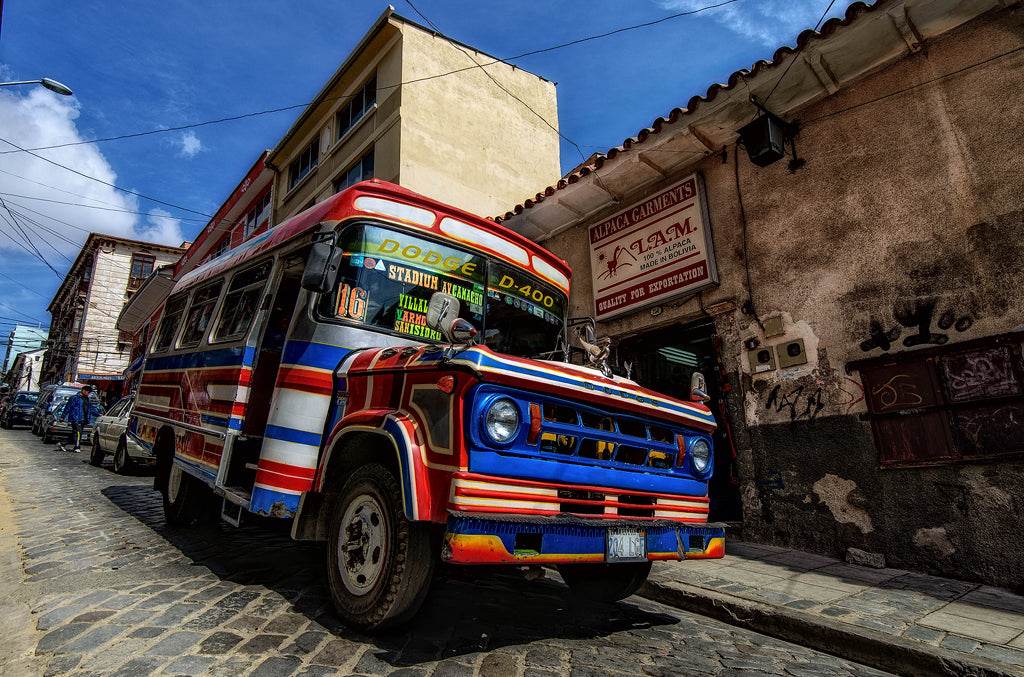
Beauty in the Scraps: Hustle, Heart, and Handcrafted Miracles
Share
I never made it to Cartagena or Cusco, but I have spent nights wandering the back streets of Mexico City, mornings dodging incense smoke in Guatemala, and whole winters breathing the thin, sharp air of El Alto. Those places taught me the same lesson: when cash dries up, creativity shoulders the load. Scarcity is never quiet; it clanks, laughs, and hustles.
In Mexico City I met José, a wiry painter working the underside of an elevated highway near Doctores. His “brushes” were soda bottles chewed flat at one end, and his colors came from half-empty cans rescued from construction dumpsters. He splashed jagged streaks of red and bruised indigos across the concrete, coaxing a jaguar so alive it looked ready to pounce into traffic. A cop idled his motorcycle to watch. José kept painting. “Good paint costs money,” he said. He flicked bargain‑bin yellow into the jaguar’s eye, grinning because trash is free. Three days later city workers rolled gray primer over the mural. José shrugged, walked two blocks down the viaduct, and started again. Art, like weeds, finds cracks.
My first glimpse of that stubborn spirit came from my mother. She hauled me to Guatemala when I was a teenager, an early passport stamp that smelled of diesel, pine smoke, and wet earth. In the maze of stalls at Chichicastenango I met Doña Reyna, a grandmother whose hands looked carved from the same pine she shaped. Storms had flattened her family orchard years earlier. She dragged the fallen trunks home, split them by hand, and now, between bursts of tourist traffic, carves masks. Her tools are a sharpened screwdriver and a stubby machete. When I asked how she manages such fine detail she laughed. “You work slow,” she said, “and you let the mistakes stay. They show I’m not a factory.” I watched her paint a tiger mask the color of blood‑orange peel, the surface still rough where wind scars cross the grain. Imperfections give the piece a pulse.
Bolivia is tougher, altitude, politics, weather, yet the ingenuity there runs hot. In El Alto’s sprawling market I followed the ping of hammer on steel to a half‑roofed workshop where two brothers, Miguel and Juan Quispe, beat dented oil‑drum metal into parade helmets for the next Diablada festival. The drums cost nothing, castoffs from a neighborhood garage. A few hours of pounding, rivets yanked from busted appliances, a coat of thrift‑shop lacquer, and the helmets catch light in raw, uneven glints. Miguel wiped sweat with a rag torn from an old soccer jersey. “We don’t melt poverty into art,” he said. “We bend it until it does what we need.”
I know that hustle. Years back in New Orleans I watched vendors thread late‑night traffic with coolers of beer, selling survival one can at a time. Same instinct, different soundtrack. But south of the border the craft goes deeper. People here don’t just keep the lights on; they build small worlds from scraps.
My suitcase rattled when I left Guatemala: wooden masks, a stone slingshot, a woven bag streaked with sliced grocery‑bag plastic. Each object carries fingerprints, weather, attitude. It reminds me that beauty has nothing to do with pristine materials and everything to do with grit.
Which brings me to a palm‑sized clay chiva bus resting on our shelf. In the Andean highlands a chiva, Spanish for goat, is the open‑sided, paint‑splattered bus that hauls people, produce, livestock, and the occasional motorcycle across switchbacks no sane highway planner would bless. The artisan who made this miniature pinched it from local red clay, fired it in a backyard kiln that probably doubles as a barbecue, then dressed it in carnival colors: midnight‑blue hood, fire‑engine‑red windows, snow‑white roof. A tiny mechanic dangles from the open yellow hood, arms buried in an imaginary engine, while two passengers peer from square windows, curious but patient. On top rides a stack of cargo—bananas, a lime‑green melon, a pink bundle, all sculpted from the same earth. Even the wheels, fixed in place, wear little white‑slip hubcaps, proof the maker refused to leave any surface silent.
Set it on your desk and you can taste diesel on dusty air, hear a fruit vendor barking prices over bleating goats, feel an elbow jammed into your ribs as the real chivas claw their way up a gravel pass. The clay miniature isn’t cute; it’s a tribute to raw survival logic. You cram in, you sweat, you choke on exhaust, and you still laugh because the wheels keep turning and you’re inching toward whatever comes next. The artisan baked that grit into the clay—no polish, no comfort, just stubborn momentum and the certainty that if you can’t afford space, you’ll pack the space you have with life.
That’s resilience you can hold in one hand. The bus is idling online right now, engine forever half‑fixed. It’s a dusty reminder that ingenuity always outranks polish.
